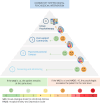Therapeutic alliance in a stepped digital psychosocial intervention for breast cancer patients: findings from a multicentre randomised controlled trial
- PMID: 39865983
- PMCID: PMC11822986
- DOI: 10.1192/bjo.2024.844
Therapeutic alliance in a stepped digital psychosocial intervention for breast cancer patients: findings from a multicentre randomised controlled trial
Abstract
Background: Action mechanisms of therapeutic alliance in stepped and digital interventions remain unclear.
Aims: (a) To compare the development of therapeutic alliance between psychosocial treatment as usual (PTAU) and a stepped digital intervention designed to prevent distress in cancer patients; (b) to analyse the level of agreement between patients' and therapists' therapeutic alliance ratings; and (c) to explore variables associated with therapeutic alliance in the digital intervention.
Method: A multicentre randomised controlled trial with 184 newly diagnosed breast cancer women was conducted. Patients were assigned to digital intervention or PTAU. Therapeutic alliance was assessed at 3, 6 and 12 months after inclusion using the working alliance inventory for patients and therapists. Age, usability (system usability scale), satisfaction (visual analogue scale), type and amount of patient-therapist communication were analysed as associated variables.
Results: Patients and therapists established high therapeutic alliance in the digital intervention, although significantly lower compared with PTAU. The development of patients' therapeutic alliance did not differ between interventions, unlike that of the therapists. No agreement was found between patients' and therapists' therapeutic alliance ratings. Patients' therapeutic alliance was associated with usability and satisfaction with app, whereas therapists' therapeutic alliance was associated with satisfaction with monitoring platform.
Conclusions: A stepped digital intervention for cancer patients could develop and maintain strong therapeutic alliance. Neither the type nor amount of communication affected patients' therapeutic alliance, suggesting that flexible and available digital communication fosters a sense of care and connection. The association between usability and satisfaction with digital tools highlights their importance as key therapeutic alliance components in digital settings.
Keywords: Cancer survivor; mHealth; psycho-oncology; stepped-care; therapeutic alliance.
Conflict of interest statement
None.
Figures


Similar articles
-
The contribution of the quality of therapists' personal lives to the development of the working alliance.J Couns Psychol. 2013 Oct;60(4):483-95. doi: 10.1037/a0033643. Epub 2013 Aug 19. J Couns Psychol. 2013. PMID: 23957765
-
Therapeutic alliance and treatment outcome in psychodynamic psychotherapy of depressed breast cancer patients: the same old story or different from other populations?Breast Cancer. 2017 Nov;24(6):765-773. doi: 10.1007/s12282-017-0777-9. Epub 2017 Apr 28. Breast Cancer. 2017. PMID: 28451956 Clinical Trial.
-
E-health ecosystem with integrated and stepped psychosocial services for breast cancer survivors: study protocol of a multicentre randomised controlled trial.BMJ Open. 2021 Mar 8;11(3):e041548. doi: 10.1136/bmjopen-2020-041548. BMJ Open. 2021. PMID: 34006024 Free PMC article.
-
Patient and therapist perspectives on alliance development: therapists' practice experiences as predictors.Clin Psychol Psychother. 2015 Jul-Aug;22(4):317-27. doi: 10.1002/cpp.1891. Epub 2014 Feb 26. Clin Psychol Psychother. 2015. PMID: 24574034
-
Perfectionism and Therapeutic Alliance: A Review of the Clinical Research.Res Psychother. 2017 Apr 13;20(1):264. doi: 10.4081/ripppo.2017.264. eCollection 2017 Apr 13. Res Psychother. 2017. PMID: 32913736 Free PMC article. Review.
References
-
- Hollis C, Sampson S, Simons L, Davies EB, Churchill R, Betton V, et al. Identifying research priorities for digital technology in mental health care: results of the James Lind Alliance Priority Setting Partnership. Lancet Psychiatry 2018; 5(10): 845–54. - PubMed
-
- Bordin ES. The generalization of the psychoanalytic concept of the working alliance. Psychotherapy 1976; 16(3): 252–60.
-
- Flückiger C, Del Re AC, Wampold BE, Symonds D, Horvath AO. How central is the alliance in psychotherapy? a multilevel longitudinal meta-analysis. J Couns Psychol 2012; 59(1): 10–17. - PubMed
-
- Bisseling E, Cillessen L, Spinhoven P, Schellekens M, Compen FR, van der Lee ML, et al. Development of the therapeutic alliance and its association with internet-based mindfulness-based cognitive therapy for distressed cancer patients: secondary analysis of a multicenter randomized controlled trial. J Med Internet Res 2019; 21(10): e14065. - PMC - PubMed
-
- World Health Organization. Adherence to long-term therapies: evidence for action. WHO, 2003. (https://iris.who.int/handle/10665/42682 [cited 23 Oct 2024]).
Grants and funding
LinkOut - more resources
Full Text Sources

